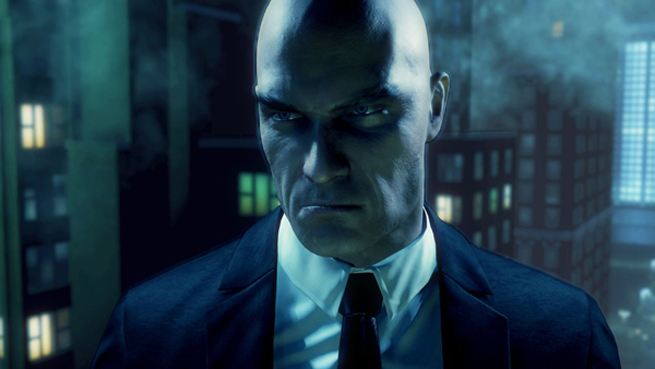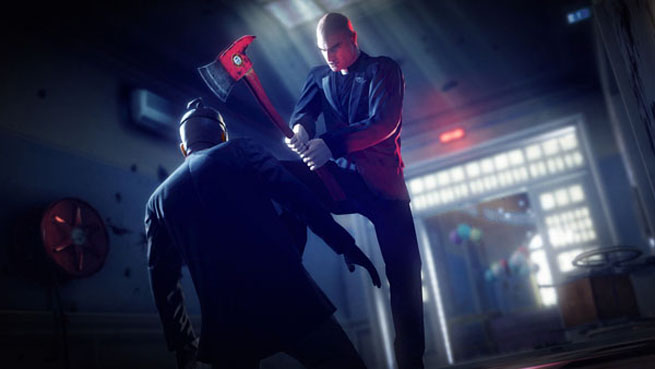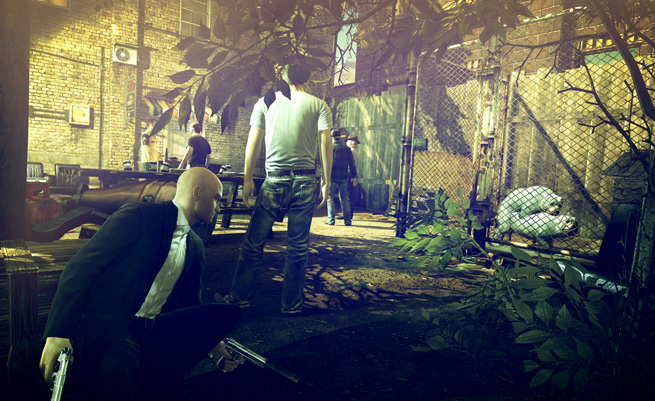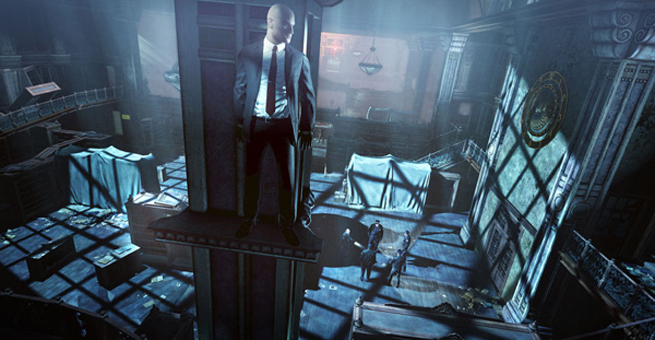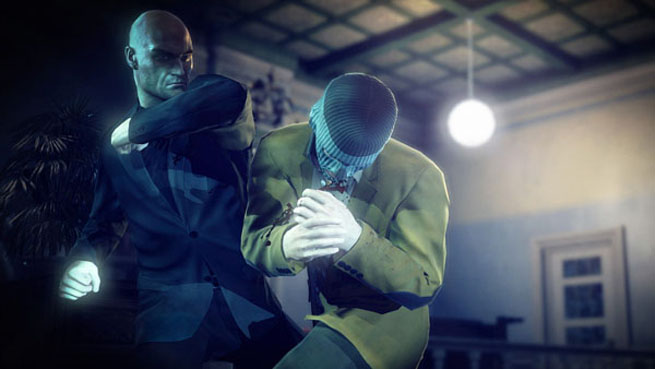This review contains some spoilers.
You’d think Diana Burnwood would’ve known better. For years, she contracted remorseless killer Agent 47 to erase well-protected targets in hard-to-reach places. When she betrayed her colleagues in the Agency, she must have guessed who they’d send to end her. And knowing 47’s talent for infiltration and crafting perfect murders, you’d think she’d take a few bonus precautions.
But no. She’s the easily dispatched target in Hitman: Absolution’s tutorial mission. It’s Diana’s last request that really kicks up trouble.
And thank goodness. We used to get a new Hitman game every two years; it’s been six since we last slipped on a clever disguise and silently assassinated scumbags without leaving any traces. A lot’s changed in the action-stealth genre since bald, barcoded, super-clone 47 last plied his trade. To its credit, Hitman: Absolution (available November 20 on PC, PlayStation 3, and Xbox 360) keeps up with the times admirably. This fifth entry in the series, however, doesn’t always feel much like a Hitman game.
WHAT YOU’LL LIKE
Welcome back, 47
You might wonder what it takes to get under the skin of a man created by unscrupulous scientists to be the perfect assassin. Hitman: Absolution shows you. Twice.
But don’t think 47’s heart thawed any since we last saw him. The new creative team at Io Interactive (most of the original Hitman crew left in 2008) knows exactly what his buttons are, and they push them expertly. New players might not fully get his motivation, but long-time fans will pick up the queues with ease. The plot puts 47 on a far more personal journey than ever before, something that’s going around lately, even if the story itself isn’t terribly deep. Absolution does throw in a few smart “nothing” interludes that mainly serve as interactive character beats. Taking your victim deep into the desert to dig his own grave. Stopping by your tailor to buy a new suit. Moments like that stick in my memory.
It also means you do a lot more than Hitmans past allowed. It’s nice to stretch out a bit. At one point, 47 has to start — and participate in — a massive bar fight to cover his movements. He lays low on a crowded train platform, waiting for his ride to arrive as police comb the area for him. He sneaks through corn fields to avoid (or silently pick off) paramilitary goons and terminate a squad of PVC-clad gun-nuns.
So no, Hitman hasn’t given up its more gonzo instincts. It does present several impressive, tense set-pieces backed by graphics and a game engine that create convincing environments filled with living, breathing people … sometimes to capacity. Apply that lifelike standard to Mr. 47, too. He’s still the methodical stone killer, but now he has purpose. That’s a nice change.
Options and more options
It’s not Hitman if you can’t choose your own adventure. Past installments gave you plenty of options for nailing a mark: a bullet to the head, a shove over a ledge, a booby-trapped barbecue, a convenient great white shark. Absolution doesn’t tip into wacky murder all that often (or wacky costumes; no killing people dressed as Santa Claus this time), but every task assigned comes with multiple paths to its execution. Even a simple trip to a cameo-rich gun shop offers at least three ways to retrieve your lost Silverballer pistols. Nice. Not so nice. Kill everyone in sight.
Unlike previous games, that last one’s a viable option now. Discovery doesn’t equal death anymore; you can shoot through the levels without embarrassing yourself. Absolution strongly encourages a quiet approach and will, in fact, dock you heavily for turning it into a shoot-’em-up (as part of an unsatisfying, automated, poor-man’s upgrade system). Those gunfights feel more tactical and less thrilling than a dedicated shooter, though enemy A.I. still shows no qualms about strolling right into your field of fire. They still fly like punctured balloons when shot, too. It’s far from the best way to tackle Absolution’s challenges, but at least you can effectively carry on past any slip-ups.
Luckily, you don’t have to wander aimlessly to find “accidents” to arrange. Hints and “point of interest” markers (seamlessly replacing the map) draw your attention to clues you might otherwise miss. You can find more in the menus, which outline all the various methods of dispatch in vague terms … just enough to aim you in the right direction. And it’s as immensely cool as ever to pull them off.
Good Instinct
It might sound like a balancing nightmare, but Absolution’s new Instinct system folds beautifully into any tactics you want to roll with. More than that, if used correctly, it solves the stealth genre’s age-old problem with trial-and-error gameplay.
On a “silent assassin” run, Instincts let you blend in, find traps you can set, see enemies through walls, and get a few precious seconds’ warning before their path intersects with yours. I could take a proactive approach to sneaking around instead of waiting and hoping nobody would spot me. You’ve only got a limited reservoir of Instinct to draw from — performing Hitman-ish actions like hiding in plain sight, silent takedowns, and sinking a headshot or two refills it — so you’ve still got to pick your moments.
And nothing burns through Instinct like getting aggressive with it. You can use “point shooting” to slow-mo the action, tag anyone or anything you see, and plug them all before anybody can blink. If that sounds similar to Splinter Cell: Conviction’s “mark and execute” feature, that’s because it’s a direct steal with one crucial difference. Point shooting costs Instinct for every mark you set, and it draws Instinct while you’re marking those targets. If you take your sweet time aiming, you’ll run dry before you can get the job done. It’s a boost more than a solution.
I didn’t actually use point shooting too much; the controls for activating and using it are unwieldy at best. And that’s a recurring theme with Absolution: It brings good ideas to the table, but the details often need more work.
WHAT YOU WON’T LIKE
What, me stealthy?
Agent 47’s ability to disguise himself in anyone’s clothes stands as one of Hitman’s signature features. It’s key to walking into areas you’re not supposed to be in without raising the alarm and walking out again unnoticed. The first Hitman game made disguises foolproof, and that felt unbalanced. Absolution swings way, way, way too far in the other direction.
Now disguises only effectively work at a distance. Get too close — this can be 10 feet or 200 feet — and guards instantly become suspicious. I can only guess that every cop and guard knows every other guard and cop in their department by sight. One even sniffed me out through a closed door. You must use Instinct (if you have any) to bluff your way past, or simply break the line-of-sight so they instantly forget you. Failing that, suspicion quickly spikes into an alert, and then you can kiss stealth goodbye. Once a disguise is blown, it’s blown across every area for the rest of the mission. You’ve got super-observant opposition with the best communication skills ever.
This makes it feel largely pointless to use disguises at all. Hitman: Blood Money made you fairly incognito unless you started acting out of character (or let your reputation get out of hand), but Absolution practically discourages a stealthy approach by making it so onerous. And of course, it punishes you for just shooting people. So much for playing any way you want.
Control issues
Hitman really needed a cover system three games ago. It didn’t need one that super-glues you to any flat surface and suddenly pops you out of shelter for no reason.
Meanwhile, Absolution shoves melee combat into the quick-time-event locker. Expect two standard button presses and one (of two) randomized finishers. It’s lazy, but it works unless your attacker comes at you from behind. Then the prompts happen off-screen, and you take the punch. Engaging in fisticuffs — which the AI can trigger as easily as you can — also locks you into those animations until somebody goes down. If your opponent has a few gun-toting buddies around, they help out by filling you full of lead, and you can’t do a damn thing about it.
The control map suffers generally from piling too many functions onto one contextual button. If a press-for-hint notification pops up, I might accidentally burn precious Instinct instead. Many’s the time I crept up on somebody expecting to perform a fast kill only to find myself mashing a button to choke my victim out while his friend shot me. Nope, you can’t cancel out of that, either. You can cancel out of picking a lock if somebody happens by, though. Let’s hear it for consistency.
It’s not very Hitman-ish
Despite a fairly long campaign, Absolution is surprisingly light on traditional Hitman-style assassinations. Those drop you in a tricky environment with a target or three to delete, then the game steps back to let you figure out the details on your own. This happens exactly three times out of 20 story chapters. And you can finish off 2/3rds of those in five minutes flat.
(Yes, you can spend more time finding more devious ways to foreclose on your victims, but I just can’t think of a good reason why such ridiculously shallow options exist at all.)
Otherwise, you spend the majority of the game traversing areas past scores of guards to reach the door to the next area. That’s Splinter Cell. When I play Hitman, I want to access an inaccessible target and quietly arrange their demise, but Absolution dangles that carrot at the very end of a very long tunnel. I frequently felt myself growing impatient trying to reach the actual mission, and that’s the death of a stealth game. Absolution relies heavily on the new Contracts mode, which splits out pieces of the campaign for create-a-hit challenges, to pick up the assassinating slack. I’m afraid that doesn’t excuse its near-absence in the primary mode.
The levels aren’t poorly designed, and indeed, later missions assign secondary targets to eliminate on your way from Point A to Point B. Those play very nicely indeed, but I spent way too much time in Absolution waiting to do what I really wanted to do. That’s never a good sign.
CONCLUSION
While it’s great to see 47 back in business, Hitman: Absolution drifts too far from the franchise’s sweet spot. A lengthy campaign offers plenty of opportunities for diabolical fun, but the stealth mechanics feel like a string of bad decisions, and a lack of pure assassination missions — exactly what the franchise built its fame on — doesn’t help. Most telling, this isn’t the Hitman I’ll revisit for years to dig out all its secrets. That honor stays with Blood Money. I like a lot of what it does and what it tries, but its faults make Absolution something I can’t quite forgive.
Score: 7.5
The publisher provided a non-retail copy of this game for the purpose of this review.
VentureBeat's mission is to be a digital town square for technical decision-makers to gain knowledge about transformative enterprise technology and transact. Learn More

